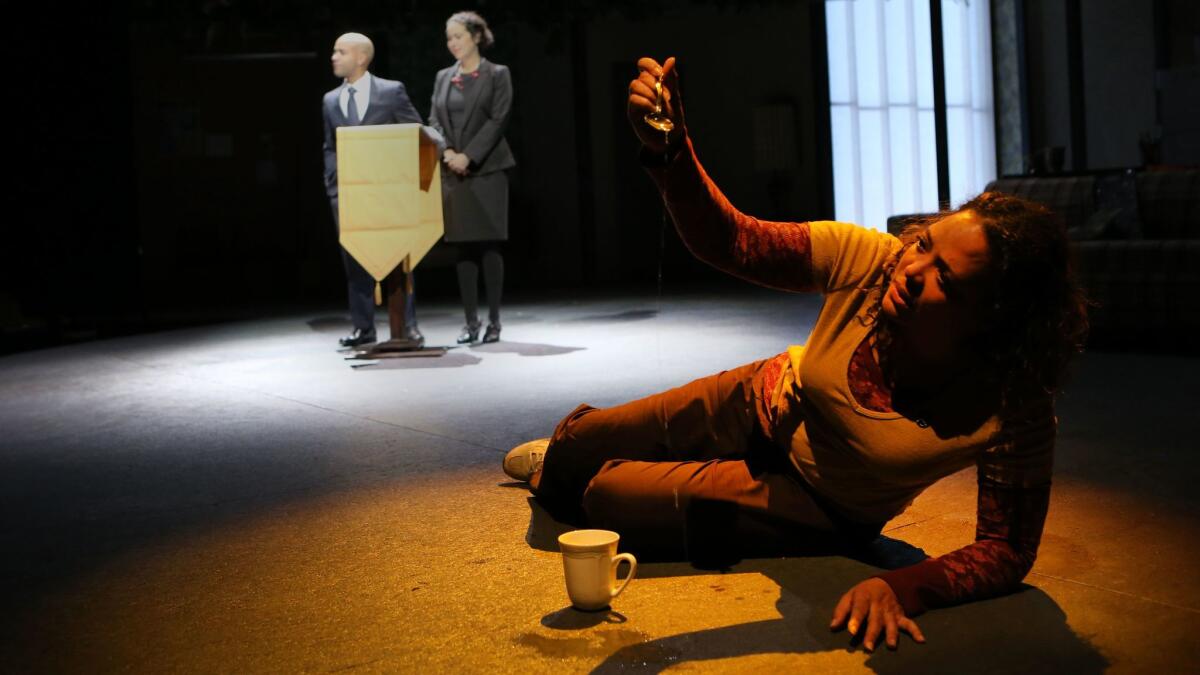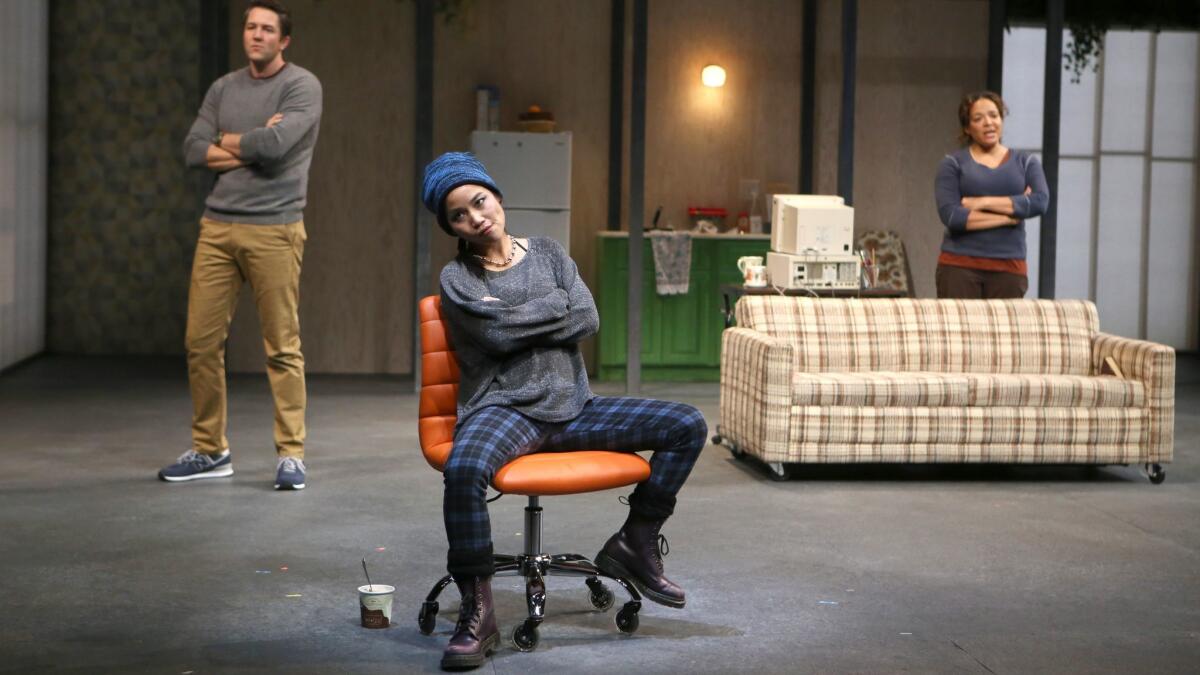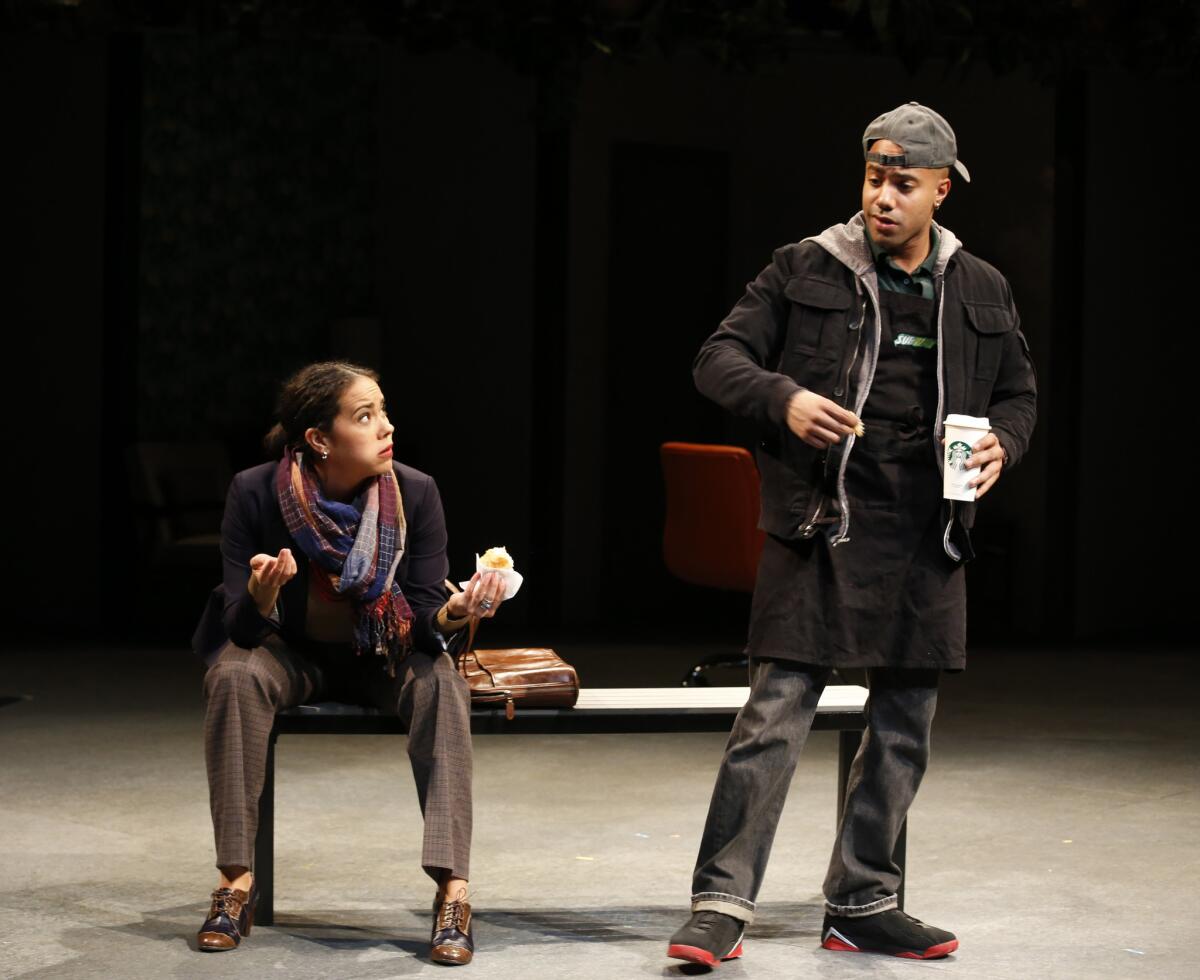Review: ‘Water by the Spoonful’ at the Taper: Broken souls, and a cast, in search of connection

- Share via
“Water by the Spoonful,” Quiara Alegría Hudes’ Pulitzer Prize winner, is a family drama that redefines what family means for those struggling not to fall through the cracks of an increasingly fractured society.
This supple and deeply felt play, which opened Sunday in a disappointingly shaky production at the Mark Taper Forum, throws a compassionate spotlight on a cross-section of characters caught between worlds. For the lost and broken figures in this second installment in the playwright’s Elliot trilogy (a series of works that can be experienced individually), community isn’t merely a pleasant afterthought but the source of redemptive possibility.
Elliot (played here by Sean Carvajal) is at the center of the drama, just as he is in “Elliot, A Soldier’s Fugue,” which is concurrently playing at the Kirk Douglas Theatre in a Los Angeles-wide production of the trilogy that concludes with the “The Happiest Song Plays Last” (opening later this month at the Los Angeles Theatre Center).
Back from Iraq and haunted by an Arabic-speaking ghost (Nick Massouh) who has followed him home from war, Elliot is hobbled by a severe leg injury and post-traumatic stress. Life in Philadelphia is trying enough without these problems.
Beloved community leader Ginny, the woman who raised Elliot, is succumbing to cancer. Dedicated to caring for her, Elliot works at a Subway in a part of town where he won’t run into anyone he knows. When not blowing up in frustration, a regular occurrence, he dreams about moving to Los Angeles to try his hand at becoming an actor.
Elliot enjoys a sibling-like closeness with Yazmin (Keren Lugo), an adjunct music professor at Swarthmore who is going through a divorce but is always available to her younger cousin. A lecture she gives to her class on the jazz revolutionary John Coltrane, just at Elliot finds out that Ginny is about to die, offers us a key to how the play is musically structured.
Yaz’s topic is on dissonance, the way Coltrane “democratized the notes” and allowed ugliness to become “an end in itself.” Hudes follows suit with her democratizing of characters whose difficult stories are not going to smoothly harmonize, never mind happily resolve by the end of the play.

Odessa (Luna Lauren Vélez), whose connection to Elliot is one of many surprises in a drama that forces us to question our assumptions about familial relationships, moderates an online chat room for recovering crack addicts. Operating under the screen name Haikumom, she is joined by Orangutan (Sylvia Kwan), who has moved to Japan in search of her birth parents; Chutes&Ladders (Bernard K. Addison), an IRS worker in Southern California whose son wants nothing to do with him; and a newcomer who goes by the name of Fountainhead (Josh Braaten), a cocky businessman who hasn’t yet accepted that his addiction controls him.
These characters communicate via the internet, setting up a theatrical challenge that the actors handle by speaking their lines (including emoticons) directly to the audience. Adam Rigg’s set, following the script, is arrayed with a jumble of chairs separating the various realms without concern for the logic of realism.
I wish I could report that the production established the fluidity the play demands, but the staging by Lileana Blain-Cruz is muddled. The Taper is a tough house that invites intimacy while subverting it, requiring a director to think hard not only about the spatial needs of the drama but about the way these needs can be accommodated on a tricky thrust stage.
Too often, especially in the first half, the actors seem to be wandering in limbo. At Sunday’s reviewed performance, the production was halted early on after Lugo missed her cue because of illness. She eventually returned, trouper-style, but everyone seemed off rhythm. Even in the second half, actors kept having hiccups with their lines, making this opening night seem like an early preview.
But there’s a more fundamental problem with the direction. The actors, bobbing about in a vaguely defined theatrical space, are profoundly disconnected from one another, tethered only loosely to the world that Hudes has created, a free-floating landscape that transforms effortlessly from Philadelphia to Puerto Rico, Elliot’s and Yaz’s ancestral homeland, and points beyond.

Carvajal brings street cred and lively humor to Elliot, but he seems to have been brought to Philadelphia from New York via Amtrak. His Elliot exists in a cultural bubble that can’t entirely be explained by his years in the military. His speech and mannerisms contrast so markedly not only from Yaz, who was educated at fancy schools and now feels alienated from rich and poor Philadelphia alike, but also from Odessa, who has had none of Yaz’s advantages. Carvajal is operating in a theatrical ZIP Code all his own.
Lugo’s Yaz is oddly schoolmarmish in both her attire and demeanor. Kwan’s Orangutan takes dissonance a step too far with her screechy adolescent intonation. Braaten confidently tackles Fountainhead’s arrogant riffs without ever convincing us of the truth of his character’s situation. Addison lends Chutes&Ladders an anchoring presence but has a few stumbles along the way.
Vélez endows Odessa with bristling authenticity, but the lack of connection with other cast members robs her story line of the pathos that wrecked me when I first saw the play in 2014 at San Diego’s Old Globe under the direction of Edward Torres. This time around, the final moments between Odessa and Fountainhead, a scene that places him in an unexpected caretaker role, seem to occur in some remote realm with all the depth of feeling of a web page.
For a play that is constructed around the longing for belonging, all this theatrical estrangement is undermining. Some of the emotional beauty of Hudes’ writing comes through but not nearly enough. Blain-Cruz may be experimenting with her own form of directorial dissonance, but as Yaz points out, there’s a thin line between dissonance and noise.
Based on the evidence at the Taper, you would have reason to doubt my high opinion of “Water by the Spoonful” — a drama that compels us to rethink identity as something larger than one’s family of origin, occupation or current address. Home, in this quintessential 21st century American tale, is wherever the broken come together to be mended. The Center Theatre Group is welcoming, but the production is in need of repair.
♦ ♦ ♦ ♦ ♦ ♦ ♦ ♦ ♦ ♦
‘Water by the Spoonful’
Where: Mark Taper Forum, 135 N. Grand Ave., L.A.
When: 8 p.m. Tuesdays-Fridays, 2:30 and 8 p.m. Saturdays, 1 and 6:30 p.m. Sundays; ends March 11 (call for exceptions)
Tickets: $25-$95 (subject to change)
Information: (213) 628-2772 or www.centertheatregroup.org
Running time: 2 hours, 10 minutes (including intermission)
Follow me @charlesmcnulty
The biggest entertainment stories
Get our big stories about Hollywood, film, television, music, arts, culture and more right in your inbox as soon as they publish.
You may occasionally receive promotional content from the Los Angeles Times.








